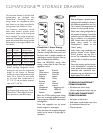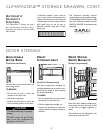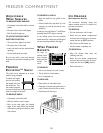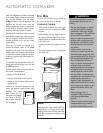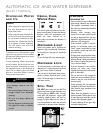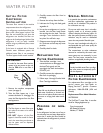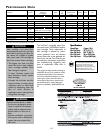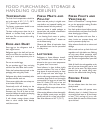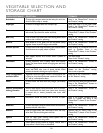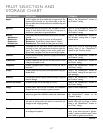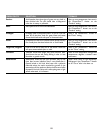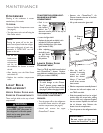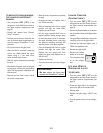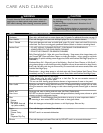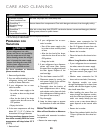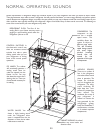
16
FRESH VEGETABLES
Artichokes
Asparagus
Beets
Bok Choy
Broccoli
Brussels Sprouts
Carrots
Cauliflower
Corn
Fresh Cut Vegetables
and Salad Mixes
Leeks
Lettuce: Boston/Bibb,
Iceberg, Romaine
Mushrooms
Radicchio
Radishes
Spinach
Sprouts
SELECTION
Choose tight, compact heads that feel heavy for their size.
Avoid if wilted, moldy or woody.
Choose firm, straight stalks with compact tips.
Choose small to medium-size beets with skin that is firm
and smooth.Tops should be tender and fresh.
Look for clean, crisp stalks with fresh-looking leaves.Avoid
product that is wilted or yellowing.
Buds should be a rich green, firm and be packed closely
together. Leaves should be bright and unwilted.
Choose small round heads with dark green,compact leaves.
Avoid those that are puffy, wilted or yellow.
Well shaped, smooth, firm carrots. Avoid if pliable or
shriveled.
Choose cauliflower that is creamy white with compact
florets.The jacket leaves should be bright green and firmly
attached.
Look for bright green, moist husks that when pulled back
reveal well filled, even rows of plump kernels. When
pricked, the kernels should give a squirt of juice.
Vegetables should be brightly colored. Avoid product that
is wilted or slimy.Avoid punctured containers. Follow “use
by,” “sell by” and expiration dates.
Choose smaller size leeks with fairly straight (not bulbed)
bases.
Avoid if leaves appear wilted, discolored, dried or translu-
cent. Avoid heads with dark butts (some minor browning
is normal due to natural processes that occur after
harvest).
Mushrooms should be plump, firm and free of spots.
Choose well-shaped, compact heads. Leaves should be dark
maroon-red with white veins.
Look for bright color, with well-formed roots and crisp,
white flesh.Tops should be green and fresh.
Look for deep green coloring. Avoid spinach that is
yellowing, wilted or has long stems.
Good quality sprouts should be brightly colored with a
crisp texture. Avoid if slimy or discolored.
STORAGE
Store in the ClimateZone™ drawer on
the “Produce” setting.
Wrap stem ends in a wet paper towel.
Store in the ClimateZone™ drawer on
the “Produce” setting.
Remove tops for storing. Store in the
ClimateZone™ drawer on the “Produce”
setting.
Store in the ClimateZone™ drawer on
the “Produce” setting.
Store in the ClimateZone™ drawer on
the “Produce” setting.
Keep handling to a minimum and use as
soon as possible. Store in the
ClimateZone™ drawer on the “Produce”
setting.
Trim tops closely.
Store on the “Produce” setting.
Store in the ClimateZone™ drawer on
the “Produce” setting.
Store in the husks in the ClimateZone™
drawer on the “Produce” setting.
Use as soon as possible.
Keep cold in the ClimateZone™ drawer
on the “Produce” setting.
Store away from foods that absorb odors.
Store in the ClimateZone™ drawer on
the “Produce” setting.
Store in the ClimateZone™ drawer on
the “Produce” setting
Store in the original container, do not
store in a plastic bag. Store in the
ClimateZone™ drawer on the “Produce”
setting.
Store in the ClimateZone™ drawer on
the “Produce” setting.
Remove tops for storing. Store in the
ClimateZone™ drawer on the “Produce”
setting.
Store in the ClimateZone™ drawer on
the “Produce” setting.
Store in the ClimateZone™ drawer on
the “Produce” setting.
VEGETABLE SELECTION AND
STORAGE CHART



